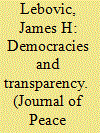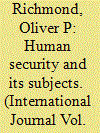|
|
|
Sort Order |
|
|
|
Items / Page
|
|
|
|
|
|
|
| Srl | Item |
| 1 |
ID:
145423


|
|
|
|
|
| Summary/Abstract |
This article argues that geoeconomics, defined as the geostrategic use of economic power, has become an increasingly important feature of regional powers’ strategic behavior. Yet, we still lack analytical tools to identify and compare regional powers’ geoeconomic strategies. The article marks a first attempt to develop a typology for differentiating potential geoeconomic strategies that regional powers may pursue in dealing with their corresponding regions. It merges the regional power focus with a geoeconomic perspective, producing the following four ideal-typical strategies: neo-imperialism, neo-mercantilism, hegemony, and liberal institutionalism.
|
|
|
|
|
|
|
|
|
|
|
|
|
|
|
|
| 2 |
ID:
073579


|
|
|
|
|
| Publication |
2006.
|
| Summary/Abstract |
This study assesses participation in the UN Register of Conventional Arms (UNRCA) in its first decade (1992-2001) of operation to determine the effects of democracy on international transparency. First, the function of the UNRCA is discussed. Second, transparency is defined and then explained by democracy and factors recognized in two international politics theories: realism, which emphasizes the effects of state capabilities and interests, and liberal institutionalism, which stresses the facilitative role of international institutions. Third, preliminary judgments are offered based on the frequency and nature of participation in the UNRCA, the consistency between export and import reports to the register, and participation in the register by democracies and non-democracies. Fourth, a cross-sectional time-series logit model is specified and tested to determine the relative effects of democracy on participation in the UN register. The study concludes that existing international politics theories go a long way toward accounting for patterns of openness and deception in international politics but not the full extent that security policies owe to domestic structures and processes.
|
|
|
|
|
|
|
|
|
|
|
|
|
|
|
|
| 3 |
ID:
121250


|
|
|
|
|
| Publication |
2013.
|
| Summary/Abstract |
The UN has changed the world by combining liberal internationalism,
the state, and liberal institutionalism, as well as by endeavouring to place
the subjects of security first. The notion of human security (HS) emerged
through these processes and through the convergence of various concepts,
including peacekeeping, human rights, development, and peace-building.
HS has been central to the UN's recent normative and legal impact and to
the UN's many peacekeeping and peace-building environments around the
world.
|
|
|
|
|
|
|
|
|
|
|
|
|
|
|
|
| 4 |
ID:
090723


|
|
|
| 5 |
ID:
136073


|
|
|
|
|
| Summary/Abstract |
The Democratic People's Republic of Korea (DPRK) justifies its nuclear weapon arsenal with the concept of deterrence. It means that it will try to miniaturize and modernize its warheads and missiles. This leads to a first-use doctrine of nuclear weapons. Obama's policy of engagement does not offer a solution to the North Korean nuclear issue as yet. In the context of its policy of critical engagement with the DPRK, the European Union has three key interests: regional peace and stability, denuclearization, and human rights. The Conference on Security and Cooperation (CSCE) could be a precedent. The CSCE process was based on three “baskets”: security, economics, and humanitarian. The multilateral Trans-Pacific Partnership is a step in this regard. This article looks at three theoretical approaches: realism, liberal institutionalism, and liberal internationalism. It concludes that a political strategy to create a stable North Korean peninsula has to go beyond nuclear deterrence that is based on the realist notion of balance of power.
|
|
|
|
|
|
|
|
|
|
|
|
|
|
|
|
|
|
|
|
|